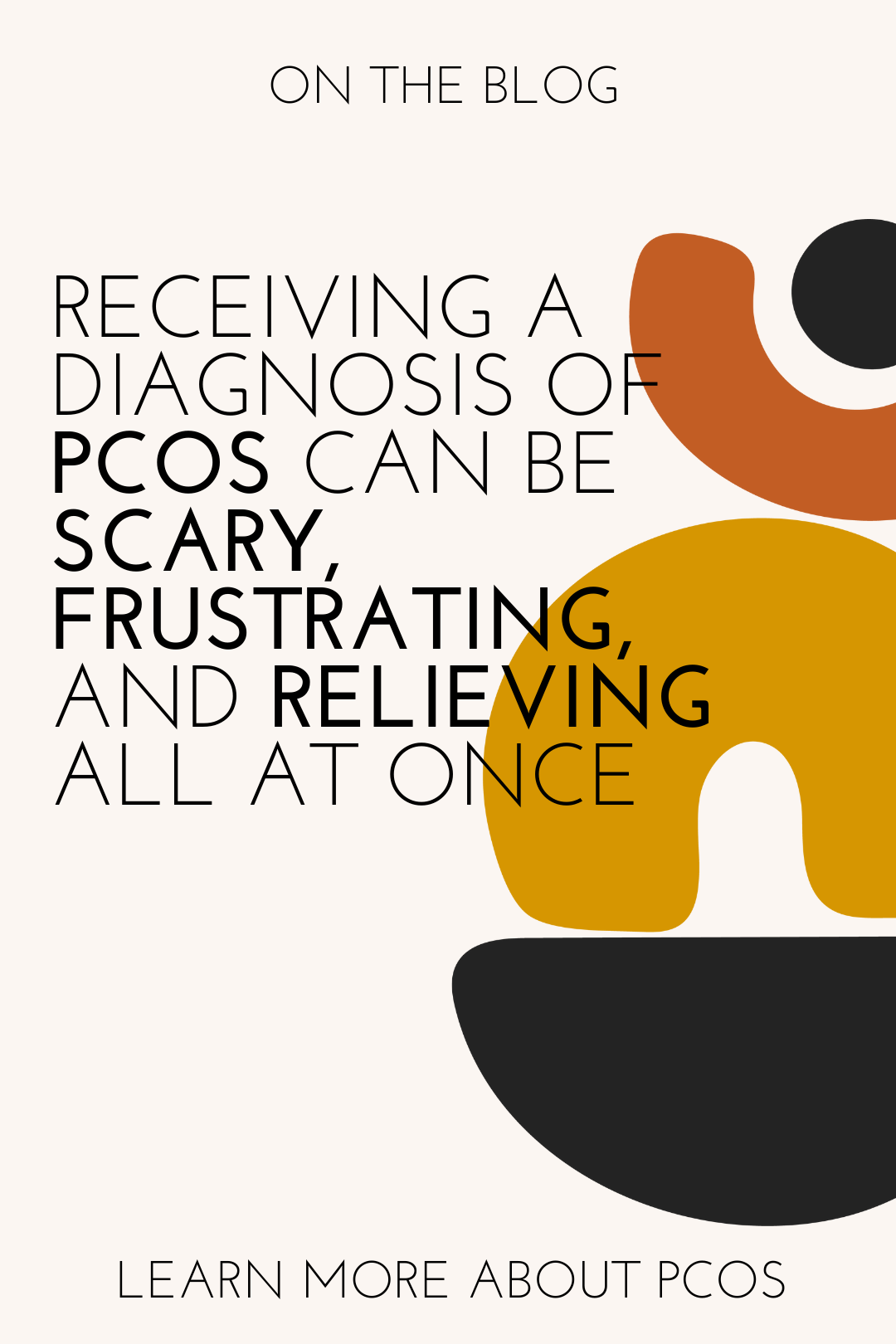Gentle Nutrition for Polycystic Ovary Syndrome (PCOS)
By: Megan Perez, dietitian at Nourishing Minds Nutrition
If you have been diagnosed with PCOS, it is very likely you have been told that dieting and weight loss are the primary ways to manage this condition. If you aren’t sure what PCOS is, please visit the blog post I wrote on the 4 different root causes and types of PCOS. This is a topic I have wanted to dissect for some time because I have heard many stories of women struggling while attempting weight loss prescribed by their doctors. Receiving a diagnosis of PCOS can be scary, frustrating, and relieving all at once. Most women with this condition will experience some or all of the following symptoms: lack of ovulation, irregular or absent periods, infertility, increased production of androgens (such as testosterone), hirsutism, acne, or insulin resistance. Women with PCOS are at greater risk for diabetes, high blood pressure, gestational diabetes while pregnant, anxiety, depression, and even breast and ovarian cancers (1). It’s understandable how this diagnosis can be overwhelming! But it may also bring relief and answers to those who have been suffering.
Because the medical community has also associated the risks listed above with “overweight” and “obese” BMI categories, doctors have been recommending weight loss as a treatment for PCOS for several years. As we know, there are MANY problems with the BMI chart including the fact that it was never actually designed for use on individuals. Most of the research surrounding BMI categories and health are based on lazy science and weight stigma. There is research to suggest that “obesity” and weight around the abdomen can worsen PCOS symptoms (2), however it is not clear whether this is due to weight and weight gain or instead, due to unhealthful behaviors (perhaps restriction and bingeing). Lastly, a research study in 2017 found that women with PCOS are OVER FOUR TIMES more likely to report disordered eating behaviors than women without PCOS. Four times! Recommending weight loss to anyone can be potentially harmful and now we have research to show (in my opinion) that recommending weight loss to women with PCOS is simply not appropriate.
So what are appropriate recommendations for women with this serious condition? The most beneficial and ideal treatment plan takes a look at your mental and physical health, as well as empowers you to make changes that work for you. Nutrition, exercise, sleep, stress management, smoking cessation, and targeted supplements and medications all play a role. In this post, I will focus on just one of many factors: gentle nutrition.
Gentle nutrition practices for PCOS:
Eat enough - The first thing that I encourage everyone (PCOS or not) to do is to ensure you are eating enough throughout the day. Dieting and restricting calories may result in slowed metabolism, preoccupation around food, binge eating, anxiety, slowed digestion, and weight gain or weight cycling. If you are a chronic dieter or struggle with disordered eating, I recommend working with a non-diet dietitian to help identify what this looks like for you. I fully believe you can be an intuitive eater while also managing a chronic illness. Calorie restriction causes our body to release cortisol (our stress hormone), which increases inflammation in our body and will only worsen PCOS.
Eat often - Insulin resistance is very common in women with PCOS, making blood sugar regulation an important goal! Eating every 3-4 hours is a good way to ensure your blood sugar does not drop, leaving you hangry and more likely to feel chaotic around food. This will also improve your metabolism and energy levels. Eating frequently will likely involve planning and preparing meals and snacks ahead of time, but the more you practice, the easier it will become!
Aim for balanced meals - This is another way to help regulate blood sugars, decreasing your risk of insulin resistance and diabetes. Include a carbohydrate, fat, and protein with each meal as well as a carbohydrate and protein or fat with snacks. Despite what you may have heard, carbohydrates are not the enemy and in fact, they are necessary for blood sugar management! When creating meals, choose high fiber and unrefined carbs most of the time. These are fruits, starchy vegetables, and whole grains, and they release glucose (or energy) at a slow rate, which improves insulin resistance. You can still enjoy refined carbs such as white bread, rice, brownies, and cake! These types of carbs release glucose more quickly than high fiber carbs, so I do recommend pairing them with a fat/protein source. Having an “all foods fit” mentality is very helpful here. Believing in “bad” and “good” foods can often lead to anxiety and disordered eating.
Combat inflammation - Because PCOS is an inflammatory state, decreasing inflammation is helpful in managing symptoms. There are many ways to combat inflammation, but eating foods rich in Omega 3s and antioxidants is one of my favorite ones! Some foods high in omega 3 fatty acids include: salmon, mackerel, sardines, seaweed, walnuts, chia seeds and flax seeds. Fruits, vegetables, nuts, seeds, whole grains and healthy oils contain antioxidants, so eating a variety of these foods will ensure you get them in. Depending on your preferences, you may set a goal of making half of your plate vegetables or incorporating several different colors of foods each day.
If you have been told by a healthcare provider to lose weight to treat your PCOS, I am so sorry. I hope this article has enlightened you and encouraged you. If you are in a place where food is causing you stress, gentle nutrition may not be helpful in managing your PCOS at this time. When “healthy” eating causes anxiety, it is no longer healthy. This is why we at Nourishing Minds Nutrition encourage intuitive eating.
Please remember that your PCOS diagnosis is NOT your fault. It was not caused by weight gain or something you did. PCOS is largely (about 70%) genetic! But there are ways for you to manage your symptoms and take back your health. I encourage you to work with a compassionate health care provider and to be kind to yourself always.
Resources and References:
1. https://www.ncbi.nlm.nih.gov/pubmed/8841217
2. https://www.ncbi.nlm.nih.gov/pubmed/23420000
3. https://www.fertstert.org/article/S0015-0282(16)63086-8/pdf
Thank you so much for this helpful blog post Megan! If you want to work with Megan, including to support your PCOS with intuitive eating, gentle nutrition and supplement protocols, learn more about our services here.






